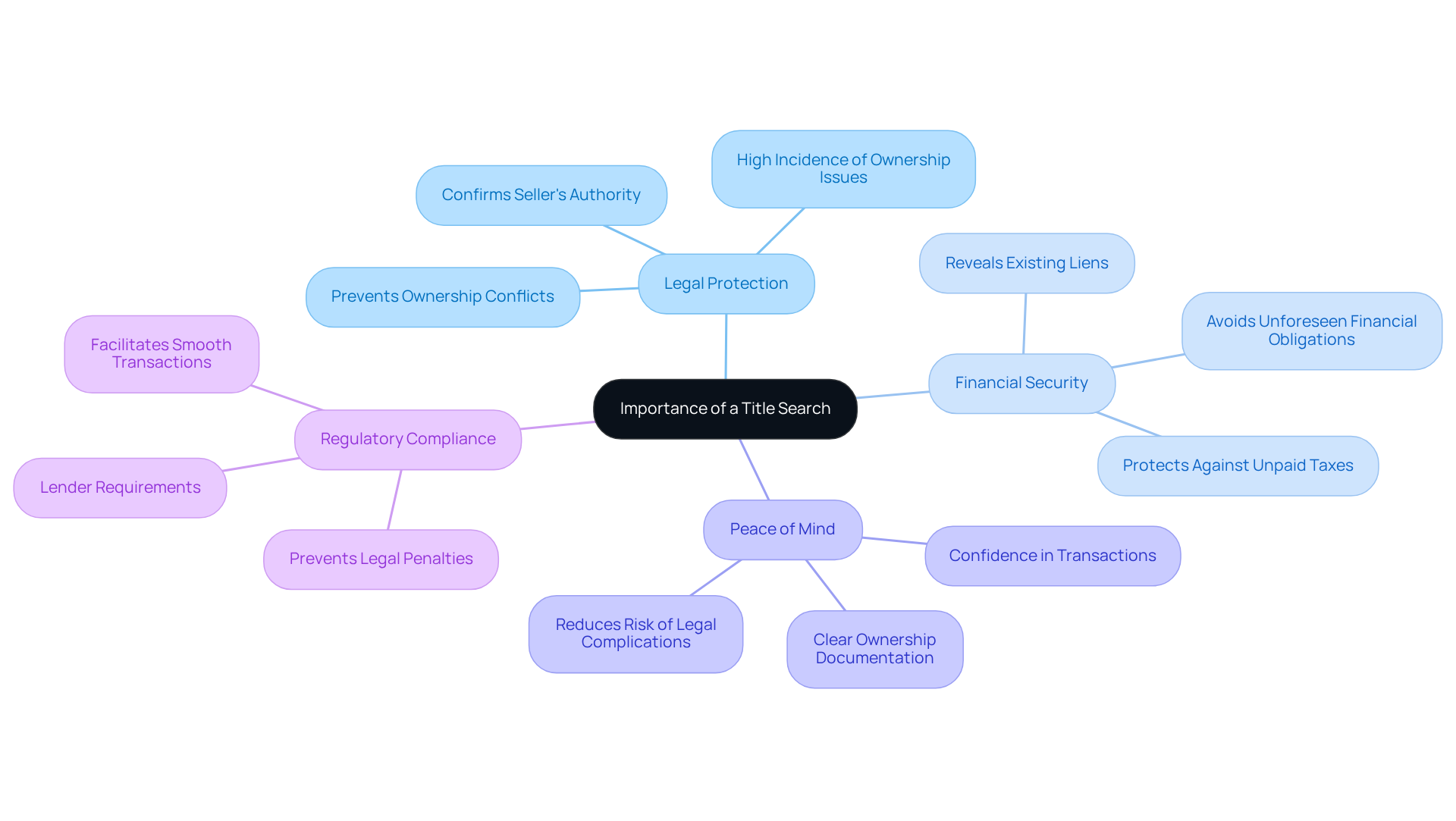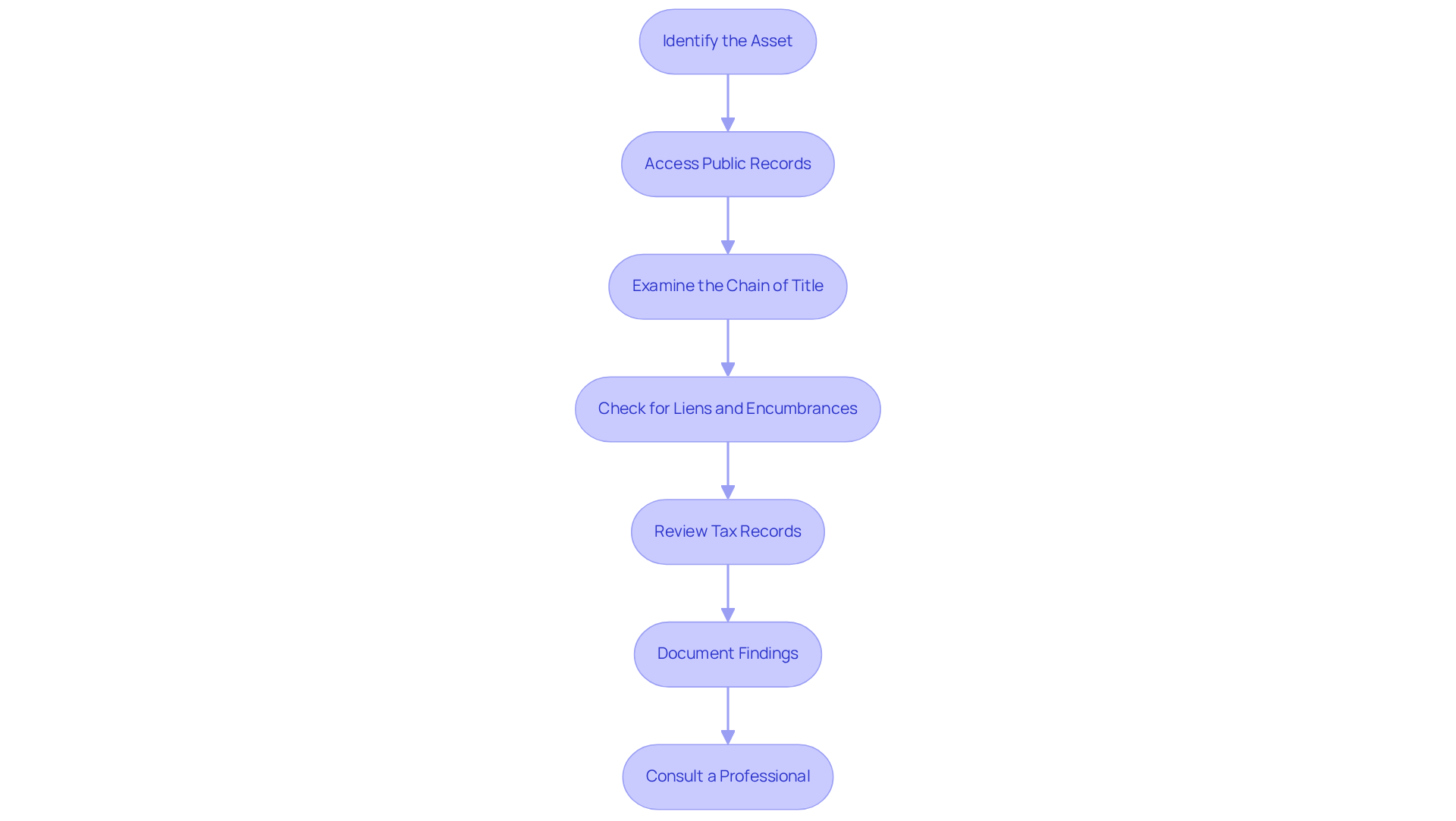Introduction
Navigating the complexities of real estate transactions can often feel like walking a tightrope—one misstep could lead to significant financial and legal repercussions. A real property title search is a vital tool in this landscape, offering buyers the chance to verify ownership, uncover hidden claims, and ensure a smooth acquisition process.
However, what happens when the search reveals discrepancies or unrecorded liens that threaten to derail a deal? Understanding the steps and solutions for conducting a successful title search is essential for anyone looking to safeguard their investment and avoid the pitfalls that can arise from overlooked details. Furthermore, being proactive in this area not only protects your interests but also enhances your confidence in the transaction process.
Understand the Importance of a Title Search
An ownership investigation, often conducted through a real property title search, is a crucial phase in real estate dealings, aimed at verifying rightful possession of an asset and uncovering any claims or liens that may exist. This process is essential for several reasons:
-
Legal Protection: Conducting a property investigation confirms that the seller has the legal authority to sell the asset. This protects purchasers from potential conflicts that may arise after conducting a real property title search and subsequent acquisition. In fact, a significant percentage of real estate transactions encounter ownership issues, underscoring the importance of this step.
-
Financial Security: By revealing any existing liens or claims, a real property title search helps buyers avoid unforeseen financial obligations, such as unpaid taxes or judgments that could become their responsibility post-sale.
-
Peace of Mind: A clear ownership document, confirmed by a real property title search, instills confidence in buyers, significantly reducing the risk of future legal complications. This assurance is vital in a market where property disputes can lead to costly boundary disagreements and lawsuits.
-
Adherence to regulations is important, as many lenders require a real property title search before approving a mortgage, making it an essential aspect of the financing process. Ensuring compliance not only facilitates smoother transactions but also protects against potential legal penalties.
Understanding the significance of a property examination is vital for ensuring a secure and prosperous real estate transaction, ultimately safeguarding investments and providing peace of mind.

Follow the Step-by-Step Process for Conducting a Title Search
A real property title search is crucial for understanding a property's ownership status. Here are the essential steps to ensure a thorough examination:
-
Identify the Asset: Start by gathering the asset's legal description, typically found on the deed or through local records. This description is vital for accurately pinpointing the asset in question.
-
Access Public Records: Visit the local county recorder's office or utilize their online portal to access public records. Search for the deed, which reveals details about current and former owners. As of 2025, many counties have improved their digital access, making it easier to retrieve necessary documents through the county clerk's or tax assessor's office.
-
Examine the Chain of Title: Review the chain of title, which outlines the history of ownership transfers for the asset. This step is essential for identifying any gaps or discrepancies in ownership.
-
Check for Liens and Encumbrances: Investigate any liens or encumbrances on the asset, such as mortgages, tax liens, or legal claims that could affect ownership. Common issues include unpaid real estate taxes or mechanics' liens, which require thorough verification.
-
Review Tax Records: Confirm that real estate taxes are current. Unpaid taxes can lead to liens against the property, complicating ownership and potentially delaying transactions.
-
Document Findings: Keep detailed notes of your findings, including any issues discovered during the search. This documentation is invaluable for resolving potential disputes and ensuring transparency.
-
Consult a Professional: If you encounter complex problems or have doubts about your findings, consider seeking assistance from a real estate expert or attorney. Their expertise can help navigate intricate property issues effectively.
By following these steps, you can conduct a comprehensive real property title search that minimizes risks and ensures a clear understanding of the property's ownership status. Typically, a property examination takes between 10 to 14 days, with a thorough investigation of ownership requiring seven to fourteen business days. Utilizing modern document retrieval software can significantly expedite this process, enhancing efficiency and accuracy. Conducting a property investigation is essential in real estate transactions to verify legal ownership and identify any liens or claims on a property. After completing the ownership investigation, obtaining property insurance is crucial to protect against any hidden ownership issues.

Troubleshoot Common Issues in Title Searches
When conducting a property investigation, you may encounter several common challenges. Here’s how to effectively troubleshoot them:
-
Incomplete Records: If you discover missing or incomplete records, consult the county clerk's office for updates or additional documents that might not be available online. This proactive approach can reveal crucial information that may have been overlooked. Furthermore, leveraging Parse AI's advanced machine learning tools can expedite the identification of missing documents by analyzing extensive sets of unstructured data.
-
Discrepancies in Ownership: Should you find inconsistencies in the chain of ownership, delve deeper by reviewing previous deeds and related court documents. Studies show that a significant percentage of title searches encounter such discrepancies, making this step essential. In fact, the average cost of claims related to fraud and forgery exceeds $143,000, highlighting the financial risks of neglecting these issues. Parse AI's document processing capabilities can assist in swiftly identifying and resolving these discrepancies.
-
Liens Not Recorded: Occasionally, liens may not be properly recorded. It’s vital to reach out to the creditor or lienholder directly to confirm any claims associated with the asset. Unrecorded liens can lead to unexpected financial burdens, making this step crucial. Additionally, utilizing Parse AI's automation tools can streamline the verification process, ensuring that all potential claims are accounted for.
-
Boundary Disputes: If questions arise regarding property boundaries, consider hiring a surveyor to clarify the official description and physical boundaries of the property. This can prevent costly disputes stemming from conflicting surveys. In addition, using Parse AI's platform can aid in gathering and analyzing relevant documents to support boundary clarifications.
-
Terminology Confusion: Title documents often contain complex terminology. If you encounter terms that are unclear, consult a real estate attorney for clarification. Expert insights can help you fully understand the implications of these terms. Moreover, Parse AI's tools can assist in simplifying and interpreting legal language, making it more accessible.
-
Unresolved Issues: If you uncover unresolved issues, such as outstanding liens or claims, collaborate with the seller to address these before moving forward with the transaction. This may involve negotiating with creditors or obtaining releases. Engaging with professionals can ensure that all parties are appropriately involved, especially in complex situations like divorce decrees that may impact property sales. Utilizing Parse AI's advanced research automation can facilitate this process, ensuring thorough documentation and resolution of issues.
By proactively addressing these common challenges, you can ensure a smoother title search process and safeguard your investment.

Conclusion
Conducting a thorough real property title search is an essential step in the real estate transaction process. It empowers buyers to move forward with confidence, knowing they are shielded from potential legal disputes and financial liabilities. The significance of verifying ownership and uncovering any existing claims or liens cannot be overstated; these factors are pivotal to the success of any property transaction.
Key points highlighted throughout this article include:
- The legal protection a title search provides
- The financial security it offers by revealing liens
- The peace of mind it instills in buyers
The step-by-step process for conducting a title search was outlined, emphasizing the need to:
- Access public records
- Examine the chain of title
- Document findings
Furthermore, common issues such as:
- Incomplete records
- Discrepancies in ownership
- Unrecorded liens
were addressed, along with effective troubleshooting strategies to navigate these challenges.
Given the critical nature of a title search, it is imperative for property buyers to prioritize this process to safeguard their investments. Engaging with professionals and utilizing advanced tools can significantly enhance the efficiency and accuracy of a title search. By taking these proactive steps, buyers can ensure a smoother transaction and protect themselves from potential future complications. Remember, a comprehensive title search is not merely a formality; it is a vital investment in peace of mind and financial security in the realm of real estate.
Frequently Asked Questions
What is a title search in real estate?
A title search is an ownership investigation conducted to verify rightful possession of a property and uncover any claims or liens that may exist against it.
Why is conducting a title search important?
Conducting a title search is important for legal protection, financial security, and peace of mind. It confirms that the seller has the legal authority to sell the property, reveals any existing liens or claims, and instills confidence in buyers by ensuring clear ownership.
How does a title search provide legal protection?
A title search confirms that the seller has the legal authority to sell the property, protecting buyers from potential conflicts that may arise after the sale.
What financial issues can a title search help avoid?
A title search can help avoid unforeseen financial obligations, such as unpaid taxes or judgments, which could become the buyer's responsibility after the sale.
How does a title search contribute to peace of mind for buyers?
A clear ownership document confirmed by a title search reduces the risk of future legal complications, such as property disputes, providing buyers with assurance in their investment.
Why do lenders require a title search?
Many lenders require a title search before approving a mortgage to ensure compliance with regulations, facilitate smoother transactions, and protect against potential legal penalties.
What is the overall significance of a property examination?
The significance of a property examination lies in ensuring a secure and prosperous real estate transaction, safeguarding investments, and providing peace of mind to buyers.




